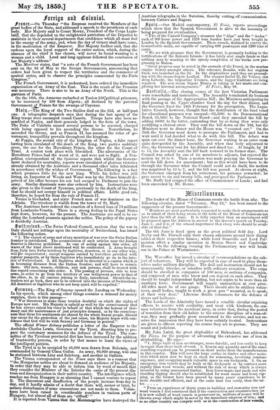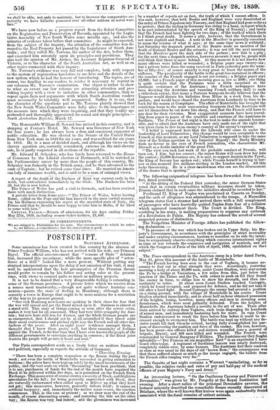31torttlautuno.
The leader of the House of Commons scents the battle from afar. The following circular, dated "Treasury, May 23," has been issued to the supporters of the present Government- " Members are most particularly requested to make their arrangements so as to admit of their being sworn at the table of the House of Commons not later than the 6th of June. It is fully expected than an amendment will be proposed upon the Address in answer to the Queen's speech on Tuesday, June 7, and it is of the utmost importance that every vote should be avail- able on that day."
The 6th June is fixed upon as the great political field day. Lord Derby and Mr. Disraeli rally their chosen adherents around their dining tables at their respective homes ; while Lord Granville and Lord Pal- merston effect a similar operation in Bruton Street and Cambridge House. On the following evening the Parliamentary war will break out in the Palace at Westminster.
The War-office has issued a circular of recommendations on the sub- ject of volunteers. They will be expected in case of need to place them- selves under military discipline. The drill and instruction should not be unnecessarily irksome, or interfere with ordinary avocation. The corps should be enrolled in companies of 100 men, or sections of companies, and composed of men who know and can depend on each other. They should be taught independent fighting, but not aspire to be more than an auxiliary force. Government will supply ammunition at cost price. All rifles must be of one guage. There should also be artillery volun- teers small bodies, taught to work a great gun "mounted, so to speak, at their very door." Likewise flotilla volunteers for the defence of rivers and harbours.
The Lords of the Admiralty have issued a sensible circular enjoining officers to receive with cordiality, and treat with kindness, the sea- men volunteers from the merchant navy, in order that, during the period of transition from their old habits to the stricter discipline of a man-of- war, they may gradually grow accustomed to the service, and not re- ceive the impression that they have been unfairly treated. Instructions are given to officers repecting the course they are to pursue. They are sound and judicious.
Mr. John Laird, the great shipbuilder of Birkenhead, has addressed the Times, for the purpose of advocating the extensive use of iron in shipbuilding. He says- " 1. Ships built of iron are stronger, more durable, and less costly to keep in repair than those built of wood. 2. Iron in any quantity and of the exact scantling required can be procured on short notice from the manufacturers in this country. This will save the large outlay in timber and other mate- rials which must now be kept in stock for seasoning, involving constant expenses, and occupying much valuable space in our dockyards. 3. On an emergency iron vessels may be built at the dockyards or by contract more rapidly than wood vessels, and without the risk of decay which is always incurred by using unseasoned timber. Iron lower masts and yards and wire standing rigging should also be substituted for wood masts and hemp rig- ging, as the former have been proved by many years' experience to be more durable and efficient, and at the same time less costly, than the lat •
ter
"From an experience of thirty years in building and managing iron and wood vessels 1 feel convinced that if the construction and reconstruction (as it is now called) of wood vessels is persevered in, millions of money will be thrown away which might be saved by the immediate adoption of iron; and as no other country can compete with us in the construction of iron vessels,
we shall be e able not only to maintain, but to increase the comparative so-
nority we have hitherto possessed over all nations in naval war- fare."
We have now before us a progress report from the Select Committee on the Registration and Preservation of Records, appointed by the Legis- lative Assembly of New South Wales some months ago, and also the Minutes of evidence taken before that committee. As might be expected, from the subject of the inquiry, the attention of the committee was di- rected to the Real Property Act passed by the Legislature of South Aus- tralia; and they called Mr. Torrens, the author of the Act, before them, and examined him minutely upon its principles and provisions. They also took the opinion of Mr. Archer, the Assistant Registrar-General of Victoria, as to the character Of the South Australian Act, as well as on other topics connected with their inquiry.
Mr. Torrens's evidence was very full and complete, both with respect to the system of registration heretofore in use here and the details of the new system which he had the honour of introducing. The topics, are of course, too familiar to our readers to render it necessary to reprint in our columns Mr. Torrens's examination. Our object is rather to show to what an extent our law reforms are attracting attention and pro- voking inquiry with a view to imitation in other communities, than to repeat again facts and arguments with which South Australian readers must necessarily be tolerably well acquainted. Suffice it to say, that the character of the questions put to Mr. Torrens plainly showed that the New South Wales Committee were fully alive to the importance of the measure into which they were inquiring, and that they readily ap- prehended and thoroughly appreciated its sound and simple principles.— South Australian .Regider, March 17.
The Honourable William H. Seward has arrived in this country, and is stopping at Fenton's Hotel. Mr. Seward was Governor of New York for four years ; he has always been a firm and consistent supporter of public education. He was elected to the Senate of the United States from New York state in 1849 for six years, and was melded for six years in 1866. He is a man of decided mark, and although his views on the slavery question are, correctly, considered, extreme on the anti-slavery side, he is justly respected in all sections of the republic.
Mr. Edward H. Schenley, who has lately been returned to the House of Commons by the Liberal electors of Dartmouth, will be watched in his Parliamentary career by more than the people of this country, Mr. Schenley was formerly in the British army, and he then advanced to the rank of Captain ; but he retired some time since. He married an Ameri- can lady of immense wealth, and is said to be a man of enlarged views.
• A report of the death of the Duchess of Kent was current early in the week, but contradicted immediately by the Globe. The Duchess has been ill, but she is now better.
The Prince of Wales has paid a visit to Grenada, and has been received there with much distinction.
A private letter from Rome says—" The Prince of Wales, before leaving Rome, called on the Pope and bid him farewell in the most cordial manner. On his Holiness expressing his regret at the unsettled state of Italy, the Prince said that he should be most happy to take him to Malta, if he liked to come with him."
CRYSTALL PALACE.—Return of admissions for six days ending Friday May 27th, 1859, including season-ticket-holders, 21,466.



























 Previous page
Previous page